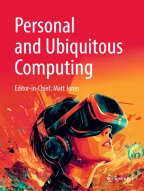Abstract
The requirement for spontaneous interaction in ubiquitous computing creates security issues over and above those present in other areas of computing, deeming traditional approaches ineffective. As a result, to support secure collaborations entities must implement self-protective measures. Trust management is a solution well suited to this task as reasoning about future interactions is based on the outcome of past ones. This requires monitoring of interactions as they take place. Such monitoring also allows us to take corrective action when interactions are proceeding unsatisfactorily. In this vein, we first present a trust-based model of interaction based on event structures. We then describe our ongoing work in the development of a monitor architecture which enables self-protective actions to be carried out at critical points during principal interaction. Finally, we discuss some potential directions for future work.
Similar content being viewed by others
References
Kindberg T, Fox A (2002) System software for ubiquitous computing. IEEE Pervasive Comput 1(1):70–81
Yu B, Singh MP (2002) An evidential model of distributed reputation management. In: Proceedings of the 1st international joint conference on Autonomous agents and multiagent systems. ACM Press, Bologna, pp 294–301
Xiong L, Liu L (2002) Building trust in decentralized peer-to-peer electronic communities. In: Proceedings of the 5th international conference on electronic commerce research (ICECR-5), Montreal
Grandison T, Sloman M (2003) Trust management tools for internet applications. In: Nixon P, Terzis S (eds) Proceedings of the 1st international conference on trust management, vol 2692, series LNCS, May 2003, Heraklion, Crete. Springer, Berlin Heidelberg New York, pp 91-107
Cahill V, Gray E, Seigneur JM, Jensen C, Chen Y, Shand B, Dimmock N, Twigg A, Bacon J, English C, Wagealla W, Terzis S, Nixon P, Serugendo G, Bryce C, Carbone M, Krukow K, Nielsen M (2003) Using trust for secure collaboration in uncertain environments. Pervasive Computing Magazine. IEEE Computer Society Press 2(3):52–61
Carbone M, Krukow K, Nielsen M (2003) Revised computational trust model. SECURE Deliverable 1.3
Paton N (1998) Active rules in database systems. Springer, Berlin Heidelberg New York. ISBN 0387985298
Gross PN, Gupta S, Kaiser GE, Kc GS, Parekh JJ (2001) An active events model for systems monitoring. Working conference on complex and dynamic systems architecture
Acknowledgements
This work is supported by the EU project SECURE: Secure Environments for Collaboration among Ubiquitous Roaming Entities (IST-2001-32486). The authors would also like to acknowledge the contribution by Waleed Wagealla.
Author information
Authors and Affiliations
Corresponding author
Rights and permissions
About this article
Cite this article
English, C., Terzis, S. & Nixon, P. Towards self-protecting ubiquitous systems: monitoring trust-based interactions. Pers Ubiquit Comput 10, 50–54 (2006). https://doi.org/10.1007/s00779-005-0030-y
Received:
Accepted:
Published:
Issue Date:
DOI: https://doi.org/10.1007/s00779-005-0030-y
